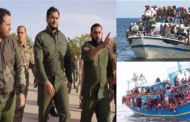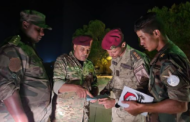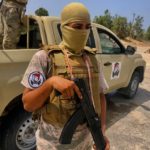AL AJAYLAT
- Dec. 2, a 16-year-old was killed and two schoolmates badly wounded while leaving school as they were attacked by armed men involved in clashes in the city. UNSMIL offered its condolences to the family of the deceased and strongly condemned the brutal attack on the innocent children.

GULF OF SIDRA
- Dec. 5, the LNA reported it was closely monitoring six Turkish battleships near Libya’s Gulf of Sidra though still outside the Libyan territorial waters, and no evidence was detected that they were approaching the Oil Crescent. The LNA confirmed its naval forces are to deal with any emergency;
- Dec. 4, satellite images caught at least 6 Turkish warships in Libya’s Gulf of Sidra, open-source intelligence website OSINT Editor reported according to the data provided by SENTINEL-1 CSAR Satellite at 17:02 GMT. The vessels “appear to be at least six frigate/corvette-sized” units of the Turkish Navy.

TARHOUNA
- Dec. 4, a defective grenade unexpectedly exploded, killing one and wounding another person in Tarhouna, southeast of Tripoli, local sorces have confirmed. The unexploded shell had been found on a farm run by a family that had fled to Tripoli during the recent war waged by Khalifa Haftar. The owners of the farm were checking their property after a year of displacement, when the grenade went off and killed one of them.
TINDI CAMP, UBARI
- Dec. 6, LNA forces aided by Sudanese mercenaries and air cover reportedly violated the national ceasefire by attacking GNA’s Sabha military zone HQ Tindi Camp in Ubari, headed by Ali Kanna. They failed as they were confronted by the local GNA troopers, who forced them into retreating to the mountain areas surrounding the camp.

TRIPOLI
- Dec. 6, recently kidnapped Dr. Al-Siddiq Ben Dalla was freed by the Interior Ministry’s Deterrence Apparatus for Fighting Crime, which then stormed the hideout of the armed group that had abducted the doctor, and detained his kidnappers. Since he was kidnapped on Dec. 1, many had called for his release, including the US embassy in Libya, UNSMIL, and the Libyan Medical Doctors Union;

- Dec. 5, Italian website Itamilradar detected a US Navy Lockheed EP-3E “Aries II” (161410) departed from Souda Bay AB allegedly on a SIGINT mission off Libya’s western coast.
INTERNATIONAL RELATIONS
- Dec. 6, UK Amb. Nicholas Hopton said Britain is ready to assist Libya in clearing mines and carrying out DNA tests to identify the victims of the Tripoli campaign, a statement by the Defense Ministry reported. Hopton and Libyan Defense Minister Salah al-Namroush met in Tripoli and agreed to boost joint cooperation between the Libyan and British Defense Ministries. The Libyan Defense Minister also discussed with the ambassador of the UK the latest developments in Libya and challenges facing the Ministry of Defense amid the UN arms embargo on the country, which left the Ministry without necessary equipment that are used in humanitarian issues like illegal immigration and coastguards’ operations, as well as mine clearance;
- Dec. 6, UNSMIL interim head Stephanie Williams said UNSMIL supports NOC’s decision to “freeze oil revenues in the Libyan Foreign Bank pending a political solution”, referring to NOC chairman, Mustafa Sanalla’s public dispute with Central Bank of Libya governor, Al-Siddiq al-Kabir over the destination of oil revenues. “We support NOC’s decision to transfer oil revenues to a temporary Libyan Foreign Bank account until a political solution is found” Williams pointed out;
- following talks on Dec. 3-4, UNSMIL head Stephanie Williams held a virtual dialogue meeting announcing that Dialogue Forum (LPDF) members had cast their votes on the proposals for the selection mechanism of a new executive authority:
- 71 LPDF members participated in the process; one was unable to participate for health-related reasons and three members abstained.
- 39 voted for proposal number 2
- 24 voted for proposal number 3
- 8 voted for proposal number 10;
- Dec. 6, the GNA Ministry of Finance and the U.S. Agency for International Development (USAID) signed a MoU outlining U.S. support as Libyan authorities work to promote fiscal transparency and improve public financial management in Libya;
- Dec. 4, GNA Defence Minister, Salah al-Din al-Namroush announced the signing in Rome of a military cooperation agreement with Italy, covering military training and expertise, cooperation on illegal migration, land and sea border security, ammunitions and mine clearance, as well as natural disaster and health emergency relief;
- speaking during Rome Med 2020, Russia’s Foreign Minister, Sergey Lavrov said Moscow had a very significant role in the calm currently prevailing in Libya, thanks to its coordination with Turkey. Lavrov indicated that it would be an oversimplification and “wrong” to merely say Russia backs up Khalifa Haftar while Turkey supports Fayez al-Sarraj, insisting that the settlement of the conflict in Libya should see the interests of all foreign players respected;
- Dec. 4, EU High Representative for Security and Foreign Policy, Josep Borrell said the EU supports the UN-led peace process in Libya and is doing whatever possible through Operation IRINI to monitor the arms embargo on Libya. Borrell added there had been many signs of hope in the past few days in Libya, considering that the ceasefire agreed upon last summer is “truly like a miracle”;
- Dec. 4, Italian Foreign Minister, Luigi Di Maio confirmed the process of stabilizing Libya had begun “but it still has a long way to go”, stressing the need for concerted efforts by the international community to “thwart any attempts to sabotage the progress made in the country”;
- Dec. 3, GNA Interior Minister Fathi Bashagha discussed joint security cooperation with UK Amb. Nicolas Hopton, including training the ministry’s security cadres in several areas, the most important of which was combating terrorism and organized crime, and benefiting from British expertise in the field of security work;
- Dec. 3, the Political Working Group of the International Follow-up Committee on Libya (IFCL) held a meeting to review the progress achieved thus far with regard to the Libyan political track, eventually welcoming the successful conclusion of the meeting of the Libyan Political Dialogue Forum (LPDF) in Tunis on November 15 and encouraging all participants to agree on the mechanisms that would allow for the establishment of the restructured Presidency Council and a new Government of National Unity;
- Dec. 1, Saudi Arabia and Egypt issued a joint statement rejecting any regional interference in the internal affairs of Arab countries, including Libyan, and the importance of ensuring freedom of navigation in the Arabian Gulf, the Bab al-Mandab Strait and the Red Sea;
- Dec. 1, Italian Foreign Minister, Luigi Di Maio stressed his country’s aim in Libya is to return the parties to the path of peace, not to exercise “colonial influence” or coercing Libyans “like some other countries” had been doing;
- Dec. 1, a new round of the Libyan Political Dialogue Forum kicked off on Zoom under the auspices of UNSMIL. The participants were offered eight proposals for the mechanism to select a new executive authority in Libya. UNSMIL said on Nov. 30 it had received eight proposals for the mechanism but noticed there had still been discussions among participants about those proposals. The mission urged the participants to give room for the proposals to be explained by one of the persons who made them, and then ask questions for further explanation;

- the Tunisian Prime Minister, Hicham al-Mechichi, promised to keep the borders with Libya and Algeria open, regardless of the circumstances. Al-Mechichi stated, during a parliamentary session in Tunisia discussing the draft state budget bill for 2021 on November 30, that his country is adhering to this decision, as the fate of Tunisia, Libya and Algeria is one and the same.

























